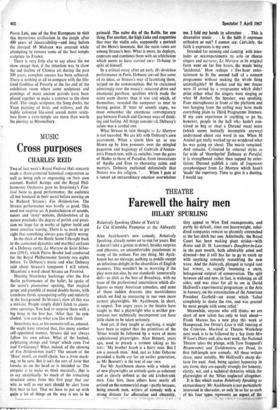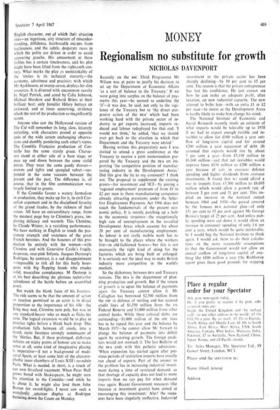Relatively Speaking (Duke of York's)
THEATRE
Farewell the hairy men
HILARY SPURLING
Le Cid (Comedie Frangaise at the Aldwych) Alan Ayckbourn's new comedy, Relatively Speaking, already seems set to run for years. But it doesn't take a genius to detect, besides surprise and pleasure, an uncomfortable puzzlement in many of the notices. For one thing, Mr Ayck- bourn has no message, nothing to peddle except an infectious delight in the absurdities of English manners. This wouldn't be so worrying if the play were not also, by our standards, unnaturally deft—as slick as the best of Broadway, with no trace of the professional smarminess which dis- figures so many American comedies, and none of those sudden descents into mawkishness which we find so reassuring in our own more earnest playwrights. Mr Ayckbourn, in short, is suspect. Ten angry years in the theatre have taught us that a playwright who is neither pre- tentious nor technically incompetent can have little claim to be taken seriously.
And yet, if they taught us anything, it might have been to expect that the primitives of the 'fifties would be followed by a wave of more sophisticated playwrights. Alan Bennett, years ago, used to preach a sermon taking as his text: 'My brother Jacob is a hairy man. But I am a smooth man.' And, just as John Osborne provided a battle cry for an earlier generation, so Mr Bennett's is the text of our own For Mr Ayckbourn shares with a whole set of new playwrights an attitude quite as coherent and as clearly defined as the old kitchen-sink men. Like him, these others have nearly all arrived on the commercial stage—partly because, being smooth men, writers of comedy with a strong distaste for affectation and obscurity, tfIntt.,;:xii tr. •••Joan*. t,v,grt • .11 they appeal to West End managements, and partly by default, since our heavyweight, subsi- dised companies remain so gloomily entrenched at the last ditch but one. Admittedly, the Royal Court has been making giant strides—with Roots and D. H. Lawrence's Daughter-in-Law in the past month, both admirably acted and directed—but it still has far to go to catch up with anything remotely resembling the new wave. And the Aldwych, plunged in turgid rant last winter, is rapidly becoming a stern, beleaguered outpost of conservatism. The split between old and new, in fact, is widening on all sides; and was clear for all to see in David Halliwell's experimental programme, at the Arts in January, on the assassination of the American President Garfield—an event which 'failed completely to shake the USA, and was greeted by most people with some relief.'
Meanwhile, anyone who still thinks we are short of new talent has only to look about— Frank Marcus has a new play this week at Hampstead, Joe Orton's Loot is still running at the Criterion, Macbird at Theatre Workshop next week is to be followed by a lay from Mrs Wilson's Diary and, also next week, the National Theatre takes the plunge, with Tom Stoppard's Rosencrantz and Guildenstern are Dead, its first full-length new comedy. All these writers share, most notably, Mr Halliwell's sharp dis- taste for cant. And, being against hypocrisy in any form, they are equally strongly for honesty, clarity, wit, and a technical dexterity which the playwrights of the 'fifties neglected altogether.
It is this which makes Relatively Speaking so extraordinary: Mr Ayckbourn is not particularly interested in character, or only 'in so far as each of his four types represents an aspect, of the • ,f 11U
English character, out of which their situation rises—an ingenious, airy structure of misunder- standing, diffidence, hairbreadth escapes from tactlessness, and the subtle, desperate ruses to which the polite are driven in order to avoid appearing gauche. His athusement, at these foibles has a certain timelessness, and his plot might have been lifted from the eighteenth cen- tury. What marks the play as unmistakably of the 'sixties is its technical maturity—the economy, adroitness and precision with which Mr Ayckbourn, at twenty-seven, deploys his slim resources. It is directed with uncommon suavity by Nigel Patrick, and acted by Celia Johnson, Michael Hordern and Richard Briers at their brilliant best; only Jennifer Hilary betrays an awkward, and at times unnerving, stridency which the rest of the production so magnificently scouts.
Anyone who saw the Hollywood version of The Cid will remember its long, slow, leisurely unfurling, with characters posted at opposite ends of the wide screen exchanging observa- tions and dumbly pondering each other's views. The Comedic Francaise production of Cor- neille has the same stately grace. Charac- ters stand at either side of a bare stage, or pace up and down between the same stolid extras. They wear the same gaudy dresses— crowns and tights and spangled velvet—sus- pended in the same vacuum between the present and the past. The difference is, of course, that in the film communication was largely limited to grunts.
If the Comedie favour a watery formalism in production, they make up for it, in civil Cor- nelian argument and in the disciplined ferocity of the grand tirades, by the richness of their voices. All have an extraordinary range, from the meanest page boy to Chimene's grave, im- ploring delicacy and warmth. This Chimene, by Claude Winter, is a ravishing performance. We have nothing in English to touch the pas- sionate strength and sweetness of the great French heroines. And the honours of this pro- duction lie entirely with the women—with Chimene and with Genevieve Casile's fragile, desperate, rose-pink Infanta. Jacques Destoop's Rodrigue, by contrast, is a sad disappointment —impossible to risk all for this burly bour- geois with big flapping hands who exudes solid, masculine complacency. M Destoop is at his best describing the glorious technicolor splendours of the battle before an assembled court.
But watch the blank faces of his listeners. The rule seems to be that the amount of action or reaction permitted to an actor is in direct proportion to the importance of his role—the King may nod, Chimene turn pale, but woe to any standard-bearer who so much as flicks his nose. The logical extension would be to play in practice tights before a blank back drop This production falls between all stools, into a dated, static fussiness strongly reminiscent of the 'thirties. But, if these prolonged, elaborate debates on tricky points of honour are to make sense at all, some kind of imaginative placing is imperative—if not a background of medi- aeval Spain, at least some hint of the claustro- phobic inner chambers of Louis XIII's mondain Paris. What is needed, in short, is a touch of our own Stratford treatment. When Peter Hall grows bored with Shakespeare, he might turn his attention to the Comedie—and while he is about it, he might also lend them, John Barton for sword-fights. I never, saw such a wre4esIlY amateur display as Rodrigue battering down the Count on Monday.































 Previous page
Previous page